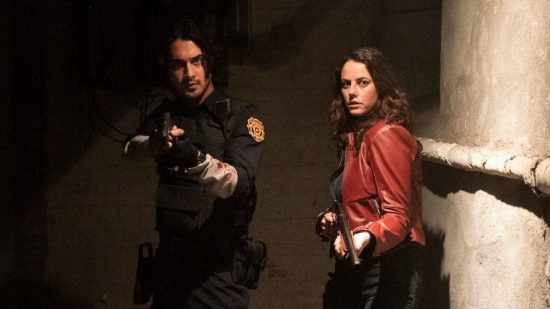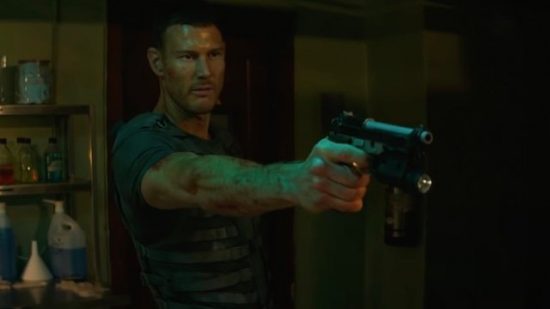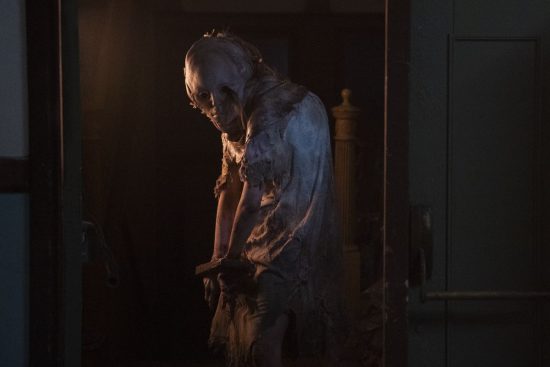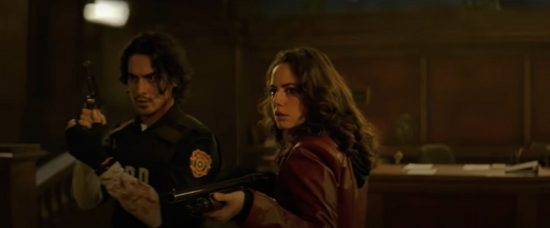Tom Hopper and Avan Jogia talk about Resident Evil: Welcome to Raccoon City
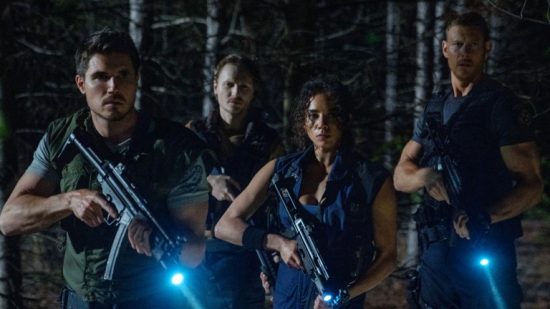
Robbie Amell, Chad Rook, Hannah John-Kamen, Tom Hopper in Screen Gems RESIDENT EVIL WELCOME TO RACCOON CITY
Returning to the origins of the massively popular RESIDENT EVIL franchise, fan and filmmaker Johannes Roberts brings the games to life for a whole new generation of fans. In RESIDENT EVIL: WELCOME TO RACCOON CITY, once the booming home of pharmaceutical giant Umbrella Corporation, Raccoon City is now a dying Midwestern town. The company’s exodus left the city a wasteland…with great evil brewing below the surface. When that evil is unleashed, a group of survivors must work together to uncover the truth behind Umbrella and make it through the night.
Written and directed by Johannes Roberts and new film stars Kaya Scodelario as Claire Redfield, Hannah John-Kamen as Jill Valentine, Robbie Amell as Chris Redfield, Tom Hopper as Albert Wesker and Avan Jogia as Leon S. Kennedy, with Donal Logue and Neal McDonough.
Tom Hopper and Avan Jogia sat down to talk about the new film.
Q: The legacy of Resident Evil is so strong among the fans between the films and the games, what is your relationship with it?
Tom Hopper: Well, it started back in 1996 when I played the very first game. I was big into gaming as a kid all through my teens and my twenties really. It was only when I had kids that it all kind of came to a halt. I remember it being the very first time that I was scared playing a video game, I had never had that experience. Games like Doom and Castle Wolfenstein gave you the apprehension aspect, but that horror element was solidified in my brain from the first time I played Resident Evil. Playstation 1 would have been the console it was on. And now you think about how many consoles have been down the line, so when I went back and looked at it, (laughs) I was like oh my God, is this the game that I was terrified of as a kid? But it was the first time I was afraid to turn it on but also addicted to playing it. So yes, it was a complete game changer for me as a game.
Q: What about for you Avan?
Avan Jogia: I was introduced to the game series through Resident Evil 4, which was obviously very Leon based. It’s a genre creating title, there was no such thing as the horror video game before Resident Evil, it’s seminal in this regard, so it created a whole genre of games. And also, it’s an experience with friends, it was experiential, two o’clock in the morning hopped up on caffeine and chips with your friends and even if you are not playing, you would watch people play Resident Evil whereas maybe you wouldn’t necessarily watch people play other games.
It was so exciting when you make a movie that you know is going to be in the cinemas, which is also an experiential moment, a group moment. I like that we are in the cinema.
Q: Tom, your character Albert Wesker is a bit of a mystery when we meet him at Raccoon City. Fans of the game know how he turns out, but in this first film, he is one of the members of S.T.A.R.S. (Special Tactics and Rescue Service). What is your take on Wesker?
TH: This was one of the conversations that I had with Johannes (Roberts – director) earlier on, we talked about the Wesker of the games, and he said he wanted to obviously keep all those elements of the betrayal but didn’t want him to be a stereotypical villain. And that was music to my ears, because there’s nothing I hate more than the stereotypical villain where you know he is a villain from straight off.
What’s great about Wesker as a character is his moral compass and what drives him and why is he doing it? I think ultimately, away from the sunglasses, he’s one of the team, he was a police officer for a long time before this changed. I wanted to find the human behind him and I wanted to find the relatability when he was just one of the guys.
But even though Wesker is funny and likeable, if you were presented with an option to get out of Raccoon City, you would understand maybe where he came from. What I really like about this version of Wesker is his morality, he carries guilt for what he does and that makes him human.
I don’t think anyone fundamentally is a bad person generally, everyone is the hero of their own story. But in this case, he’s fully aware of his wrongdoing when it comes to it. But further on from here, if the franchise was to continue, how this version of Wesker becomes in conjunction with the game Wesker, that is what is very interesting to me.
Q: Leon isn’t presented as an instant hero in this film. How did you go about trying to play a character that might not be so likeable immediately to the audience when they first meet him?
AJ: Well, it’s not that much work because Leon is such a beloved character (laughs). I mean he is the good guy, rookie cop. I think he starts off having the worst first day ever on a job. He’s just sort of thrown into this world, pushed to the backwater Raccoon City police department because he’s not that good of a cop and he wants to be a police officer for his dad.
And then purpose is thrust upon him when a zombie apocalypse breaks out. Even in a movie like this it’s good to be able to still play an arc from a rookie cop to eventually end up taking on the challenges of the world going crazy and zombies popping up in infectious messes.
Q: Since both of you played the games, what was it like to go on set, decked out in the gear as your characters? Would you fan out a little bit when that happened?
TH: There were many of those moments. I think a lot of the times we were trying to play it cool, because all of us are big kids really and we are all digging it. But it was only on certain occasions where we were on set and we were like, dude, this is so cool!
AJ: This is so great! (laughter)
TH: Yeah, one that sticks out in my head was when we first entered the mansion, that was particularly special. And I think in the police room as well, in the room where we all congregated, that was the main one where we all were together. And just the nostalgic element of it and how little bits from the game were put in there. And as being all fans of it, I think it was really special. I think the hardest thing was trying to show that we weren’t actually excited little children.
AJ: I think there was this moment where I was in the basement in one of the scenes with Kaya and we were walking through the scene normal, walking, looking for zombies, making sure you don’t die. And in the background of one of the sets, there were green herbs, which is how you heal yourself in the games, and it was just tucked in the background of the set, like little Easter Egg stuff. And that was the moment where I was like, oh that’s a pretty cool touch.
Q: How intricate did the sets get?
AJ: It’s so intricate that Capcom provided the schematics and blueprints from the game itself for the set designer to build to scale for our movie. It’s pretty insane. When you are having that level of detail and that level of faithfulness to the game and its design, I think that’s pretty exciting for the fans.
Q: Because this film takes elements and scenes from the games, as fans how was it like to reenact certain things that the fans will be super excited to watch?
TH: It’s always about switching off that element because you actually have a job to do (laughs). I remember when I was holding the Palm Pilot and playing around with it and I turned to Johannes and said, mate, this is amazing. When you are doing it, you have a little fire in your belly knowing how cool it is, but you can’t let that show. But it’s so special to do this kind of movie where you have that connection to the source material.
AJ: You turn that fire into, oh I’ve got to make sure I’ve got the codes. (laughs)
TH: Yeah exactly, use it! Use it!
Q: The sets were in a lot of old buildings; did you ever have any creepy moments on location?
TH: I think I was fairly fortunate like that. All my sets were in a studio.
AJ: The orphanage wasn’t ideal. It’s an old school. But shooting a scary movie is quite clinical. At first it’s like, look at all the zombies and they are scary and then cut to Doug the zombie asking for some water. And somebody comes around with a straw and feeds Doug water. Then you have to do your job as an actor be like, I have got to find Doug scary again, so how am I going to do that?
TH: Yeah, it kills the moment. Let’s go for a coffee Doug. Standard zombie name, Doug. (laughs)
Q: Avan, you character Leon encounters two very iconic characters from the game: Lisa Trevor and also the Licker. What can fans expect?
AJ: Well, they sort of inhabit the same space of the orphanage set. The actor who played Lisa Trevor (Marina Mazepa) was so good. She was so physical and it was easy to work with her because you are really playing off her incredible makeup design and her physicality.
The Licker was a guy in a green body sock who chased me down a hallway and was scary in its own way really. Sort of like an inhuman green Kermit man chasing me down a hallway. So, there was that (laughs). But then they composited this horrifying thing into him. The Licker is terrifying as a creature and when I saw the movie, it’s definitely anxiety inducing.
Q: Tom, you get to work a lot with Hannah John-Kamen. What was it like watching her inhabit the iconic female character of Jill Valentine?
TH: Yeah, I was lucky enough to work with Hannah the year before on another movie (SAS: Red Notice), so we knew each other pretty well. It was great going into this film knowing that we had to have a certain chemistry and dynamic. So, we kind of hit the ground running. It was really nice.
It was great to see her version of Jill come to life, because Hannah has got this great old sparkle in her eyes as an actress. And it was really interesting to see that edge that Jill needs. So yeah, it was brilliant. Johannes encouraged us to play around in our scenes together, so we had a really good time. We also spent many a night having some wonderful conversations with Hannah on those night shoots and she made it a lot easier than it could have been in a freezing cold suburb in Canada. So yeah, she’s great.
Q: A good portion of the film was shot at night and in the freezing cold. How was that like to shoot and did you guys go mad after shooting for months this way?
TH: The hardest thing was staying asleep during the day. So the lack of sleep starts to build up.
AJ: You slightly lose hours every single day until you are in a deficit.
TH: It’s only towards the end that you start to realize that. When I got home to the UK, it was nearly Christmas and only when I started to get back on a normal sleep schedule that I was like wow, that was bonkers. You just kind of go into survival mode and you don’t think about it.
AJ: Because you are like, well there’s no other way around this, so you start waking up at odd hours. If you are lucky, you start waking up like four in the afternoon. But you are usually not that lucky and you wake up earlier and then you lose a small amount of hours. And then of course when you get off work you can’t sleep.
TH: Yeah, you are kind of wired from the day’s work.
AJ: So, I am just a work horse, I wake up, I go to sleep. But for three months it’s doable, we were vamps for a little bit.
TH: It’s amazing what your body gets used to. Your body just starts to buffer it.
Q: Avan, you got to work with Kaya Scodelario a lot. What was it like to spend all this time with her?
AJ: Kaya is lovely. It was really great working with her. And it was really like, there’s almost two different individual storylines that intertwine. Kaya and I are definitely in our own storyline. And it’s lovely, she’s so great in the movie. When you are working all these long hours doing zombie stuff that’s quite serious, it’s nice to have someone who wants to muck about and have fun and keeps things light at four-thirty in the morning when we are all exhausted.
Q: Both of you have worked on extremely physical productions before. How was shooting Resident Evil compared to your other films?
TH: I have been on some things where the demand has been extremely high physically. I would say that the demand was fairly low in comparison to some of the other stuff I was doing, which is always nice (laughs) because you don’t hurt at the end of the day as much. But yeah, some minimal sort of stunt work and some action stuff is always welcomed. I love it and I get a kick out of it. It’s almost like going through a really tough workout or a game of rugby. At the end of the day, you feel like you have really earned your paycheck. Any physicality like that on the job is good fun.
AJ: One of the last things I have done physically, I was running around riding a chariot and shooting bows and arrows and sword stuff. Every time you have a gun in your hand it’s a little easier physicality wise. There’s no choreography to remember, there’s no swinging a big sword and a leather shield, you are just like, yeah, this is good.
TH: The period stuff is always more, isn’t it?
AJ: Also, I’m the rookie in this film, so it’s easy for me. They don’t expect me to be vaulting off buildings and what have you. I love that sort of stuff, I genuinely do. You get into acting to play pretend in the sandbox.
TH: You sort of want it. Because sometimes when you read a script for a movie, you see the sequences written out and you go, oh that is going to be so much fun. Then they say, well, we are going to get the stunt team to do this and you’re like, aw, I wanted to do it. You imagined it in your head doing it already.
Q: How did Johannes collaborate with you to make your characters more three dimensional?
TH: I had a chat with Johannes very early on and it was a very collaborative process from the offset. We both talked about how we saw Wesker as and what he should be in this version. I had already read the script before I met with Johannes and I got the sense of what he was going for, not like the person from the game, but a real Albert Wesker that we could all relate to.
And he just kept a very open line of communication. Anything that you had on your mind or wanted to bring to the table, any little thoughts you would have, he was always there to have conversations with. So that is a real gift, especially when you have got a big franchise like Resident Evil behind it, with studios and all these other studio execs behind it, to have that creative flow with a director.
Q: Is that rare or normal to have a director like Johannes on set?
TH: From my experience, it’s certainly becoming more common now. I think the creatives have been given much more freedom, because movies that seem to do well allow for creative freedom. There was maybe once upon a time where things were very studio heavy and exec heavy and directors weren’t necessarily allowed to really flow as much. [Resident Evil] is a great example from my experience, of the opposite of that. The execs were very trusting with Johannes and though they were there to approve everything and make sure it was within the lines of what they wanted to do with the studio, Johannes had pretty loose reins and that was great to see.
AJ: I think the audience can tell when something is creation by committee. Even though Resident Evil is such a big IP, Johannes navigates all the checks and balances so well as a director. I had a good collaborative experience with him because it felt like everyone could claim some authorship, even on such a big blockbuster, and that was just so cool.
RESIDENT EVIL: WELCOME TO RACCOON CITY will be released exclusively at UK cinemas, December 3. If hit US cinemas on 24th November 2021.

